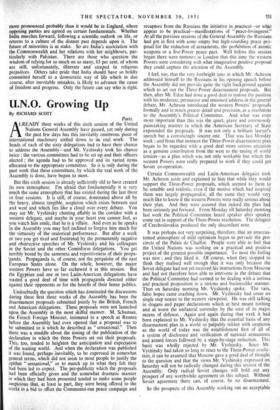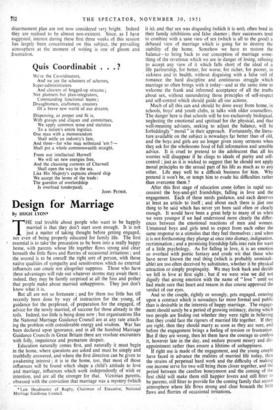U.N.O. Growing Up
By RICHARD SCOTT
Paris. LREADY .three weeks of this sixth session of the United Nations General Assembly have passed, yet only during the past few days has this inevitably cumbrous piece of international machinery settled down to its real work. The heads of each of the sixty delegations had to have their chance to address the Assembly—and -Mr, Vyshinsky took his chance twice ; the various-committees had-to be set up and their officers elected ; the agenda- had to be approved and its -varied items allocated to the appropriate committee, So it is only during the past week that these committees, by which the real work of the Assembly is done, have begun to meet.
But this sixth session is already sufficiently old to have created its own atmosphere. I'm afraid. that fundamentally it is very much the same atmosphere that has existed during the last three or four sessions. It is still, of course, dominated above all by the heavy, almost tangible, suspicion which exists between east and west and which lies like a cloud over every debate. You may see Mr. Vyshinsky chatting affably in the corridor with a western delegate, and maybe in your heart you cannot feel, as you watch him smile, that he is a villain. And even as he speaks in the Assembly you may feel inclined to forgive him much for the virtuosity of the oratorical performance. But after a week or two you get tired and frustrated by the permanently negative and-- obstructive speeches of Mr. Vyshinsky and his colleagues in the-Soviet and the other Cominform delegations. You get terribly bored by the sameness and repetitiveness of their propa- ganda. Propaganda is, of course, not the perquisite of the east European States alone. On the whole, however; the major western -Powers have so far eschewed it at this session: But the Egyptian- and one or two Latin-American delegations have wasted -a good deal:of time with propaganda directed either against their opponents or for the benefit of their home publics.
Undoubtedly the question which has dominated the discussions during these firit. three weeks of the Assembly has been the disarmament proposals submitted jointly by-the British, French and American delegations. These proposals were not launched upon the Assembly in the most skilful manner. M. Schuman, the French Foreign Ministef, intimated in a speech at Rennes before -the Assembly had even opened that a proposal was to be stibmitted to it which he described as " sensational." Then there was a muddle about the timing of the publication of the declaration in which the three Powers set out their proposals. This, too, tended to heighten the anticipation and expectation of the waiting world. And when the declaration was published it was found, -perhaps inevitably, to be expressed in somewhat general terms, which did not seem to most people to justify the epithet " sensational," or to match up to what they felt they had been led to expect. The pre-publicity which the proposals had been officially given and the somewhat dramatic manner in which they had been presented tended to make some people suspicious that, at least in part, they were being offered to the world in a bid to offset the Communist-run peace campaign and recapture from the Russians the initiative in practical—or wilt appear to be practical—manifestations of " peace-lovingness?" At all the previous sessions of the General Assembly the Russians had got in first with some empty but high-sounding peace pro- posal for the reduction of armaments, the prohibition of atomic weapons or a five-Power peace pact. Well before this session began there were rumours in London that this time the western Powers were considering with what imaginative positive proposal they could capture the attention of the Assembly.
I feel, too, that the very forthright tone in which Mr. Acheson addressed himself to the Russians in his opening speech before the Assembly did not provide quite the right background against which to set out the Three-Power disarmament proposals. But then, after Mr. Eden had done a good deal to restore the position with his moderate, persuasive and reasoned address in the general debate, Mr. Acheson introduced the western Powers' proposals formally and in much greater detail and precision, as a resolutiOn to the Assembly's Political Committee. And what was even more important than this was the quiet, grave and enormously painstaking manner in which the American Secretary of State expounded the proposals. It was not only a brilliant lawyer's speech but a convincingly sincere one. That was last Monday week ; and from that moment the Three-Power disarmament plait began to be regarded with a good deal more serious attention as a genuine contribution from the west to the easing of world tension—as a plan which was not only workable but which the western Powers were really prepared to work if they could get Soviet co-operation.
Certain Commonwealth and Latin-American delegates took Mr. Acheson aside and explained to him that while they would support the Three-Power proposals, which seemed to them to be sensible and realistic, even if the motive which had inspired them was largely propagandist, all the same they would verx much like to know if the western Powers were really serious abont their plan. And they were assured that indeed the plan had been seriously put forward. From Monday till Saturday morning last week the Political Committee heard speaker after speakg come out in support of the Three-Power resolution. The delegate of Czechoslovakia produced the only discordant note.
It was perhaps not very surprising, therefore, that an unaccus, tomed atmosphere of mild optimism began to pervade the pre, cincts of the. Palais de Chaillot. People were able to feel that the United Nations was working on a practical and positive project of the greatest possible importance. To most the feeling was new ; and they liked it. Of course, when they stopped to think they realised well enough that it was only because the Soviet delegate had not yet received his instructions from Moscow and had not therefore been able to intervene in the debate that the Political Committee had seemed to be dealing with a serious and practical proposition in a serious and businesslike manner. Then on Saturday morning Mr. Vyshinsky spoke. The vain, false hopes came crashing down. Mr. Vyshinsky had come no single step nearer to the western viewpoint. He was still talking in slogans and paper declarations which at best meant nothing and at worst the unilateral surrender by the west of its major- means of defence. Again and again during that week it had . been explained to Mr. Vyshinsky that the essential basis of any disarmament plan in a world so palpably ridden with suspicion as the world of today was the establishment first of all of a system of disclosure and verification of national armaments and armed forces followed by a stage-by-stage reduction. This basis was wholly rejected by Mr. Vyshinsky. Since Mr. Vyshinsky had taken so long to react to the Three-Power resolu-, tion, it can be assumed that Moscow gave a good deal of thought, to the question and that the views Mr. Vyshinsky expressed on, Saturday will not be radically changed during this session of the Assembly. Only radical Soviet changes will hold out any prospect of any worthwhile agreement on this subject. Without Soviet agreement there can, of course, be no disarmament_ So the prospects of this Assembly working out an acceptable disarmament plan are not now considered very bright. Indeed they are realised to be almost non-existent. Since, as I have suggested, interest during these first three weeks of this session has largely been concentrated on this subject, the prevailing atmosphere at the moment of writing is one of gloom and frustration.



































 Previous page
Previous page